November 9, 2011
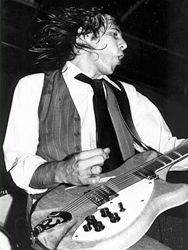 I recently had the extreme pleasure of talking with Greg Kihn—rockstar, novelist and radio personality. We covered topics as varied as his early days with Beserkley Records, his aspirations of a 3-generation Greg Kihn Band (we’re dubbing that “Kihnfolk”), the making of some of his biggest hits (hint: it included heartbreak and copious amounts of hot sake), and the days of coiffed hair and shoulder pads. Greg hit the charts for the first time in 1981 with “The Breakup Song,” although he’d been making music for years at that point. He followed that up in 1983 with an even bigger hit, “Jeopardy” which went to #2 on the pop charts. Since then, he’s written four books and has hosted the morning show on San Francisco’s classic rock station, KFOX for 13 years. He’s got a new 3-CD collection out, Kihnplete featuring the band’s post-Beserkley Records music. As a longtime fan, this was truly a treat—such a great guy.
I recently had the extreme pleasure of talking with Greg Kihn—rockstar, novelist and radio personality. We covered topics as varied as his early days with Beserkley Records, his aspirations of a 3-generation Greg Kihn Band (we’re dubbing that “Kihnfolk”), the making of some of his biggest hits (hint: it included heartbreak and copious amounts of hot sake), and the days of coiffed hair and shoulder pads. Greg hit the charts for the first time in 1981 with “The Breakup Song,” although he’d been making music for years at that point. He followed that up in 1983 with an even bigger hit, “Jeopardy” which went to #2 on the pop charts. Since then, he’s written four books and has hosted the morning show on San Francisco’s classic rock station, KFOX for 13 years. He’s got a new 3-CD collection out, Kihnplete featuring the band’s post-Beserkley Records music. As a longtime fan, this was truly a treat—such a great guy.
LT80s: Let’s start by talking about the incredibly wide range of things that you’ve done: chart-topping rock star, novelist, radio personality. Did you have any idea when you were a kid that you’d do all these things?
GK: No. I didn’t think I would do any of these things, but I’m a guy that was always bitten by the creative bug. I’ve always been interested in writing. I’ve always been interested in broadcasting. I’ve always been interested in music.
It’s ironic because back in the day when I was having hit records, we did so many interviews that I got really comfortable behind the microphone. It was a real easy transition from musician to radio guy, even though I still play a dozen gigs a year just to keep my finger in it. I guess you can say I’m pretty much a radio guy after 13 years of doing the morning.
LT80s: Let me ask you about that. I know it’s a classic rock station in San Francisco (KFOX). What is it like to play your own music on the radio and the music of your friends?
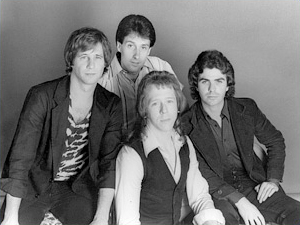 GK: It’s so deeply satisfying, not only on the spiritual level, but on the financial level.
GK: It’s so deeply satisfying, not only on the spiritual level, but on the financial level.
It’s great. Look at it this way, I’m getting paid to play the record as a DJ, and I’m getting paid as an artist, on the other end for having the record played, and I’m getting paid by ASCAP as the songwriter and publisher. I’m getting it three ways, and it’s just great.
It really is wonderful to be able to play the records of all my friends. We were kind of in the same graduating class; me, Eddie Money, Cheap Trick, Huey, and all the bands that came out around the same time that I came out. I just love it. I have great stories, because I worked with most of these people. It’s a very comfortable relationship.
LT80s: When I was thinking about all the Renaissance man things that you do, I came up with a new Kihn-pun.
GK: Oh, good.
LT80s: I’m hoping you like it. You can use it for your next album if you like. It’s Kihnetic.
GK: Kihnetic? I like that. Hey, why haven’t we used that one before? There’s been a million of them. That’s fantastic. Alli, if I use it, do I have to send you a royalty?
LT80s: Nope. You can put me in the liner notes.
GK: There you go. “Inspired by Alli.” I like that.
LT80s: Speaking of liner notes, let’s talk about that. You’ve got a new three-CD box set out, Kihnplete, and it’s all digital. I love that even though it’s digital, you wrote really great liner notes. Talk about that.
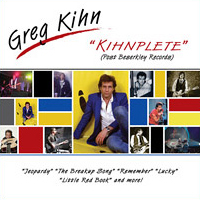 GK: I remember back in the old days when we used to buy vinyl. You remember those days. It was so much fun to read the liner notes. Of course those big albums, especially if they were double albums or foldouts, it was like a novel. You could put a ton of information in there. Then I thought because CDs are so small, and the information is so skimpy, that I wanted to write personal liner notes and my feelings about each and every song, try to get as many of the musicians credited, and try to get as much information into the liner notes as I could because personally, I enjoy reading the liner notes and I always thought of it as part of the album.
GK: I remember back in the old days when we used to buy vinyl. You remember those days. It was so much fun to read the liner notes. Of course those big albums, especially if they were double albums or foldouts, it was like a novel. You could put a ton of information in there. Then I thought because CDs are so small, and the information is so skimpy, that I wanted to write personal liner notes and my feelings about each and every song, try to get as many of the musicians credited, and try to get as much information into the liner notes as I could because personally, I enjoy reading the liner notes and I always thought of it as part of the album.
Look at the look and feel of Sergeant Pepper and how the lyrics printed over their picture. It was just iconic, or the Dillon poetry on the back of Highway 51 Revisited. It’s just beautiful stuff, so I really felt like it was my mission to write old-time complete liner notes. Since I’m a writer, I did it my way.
LT80s: You mention [in the liner notes] in a couple of places the difference in the way music was made when you were doing some of those songs and the way it’s made now. You mentioned the bright blue foot switch in the song “Whenever,” and steel drums in “Temper, Temper,” and the fact that now those same sounds would be made by buttons and switches.
GK: I think it’s lamentable, because all of the charming little tricks that a guy would take a lifetime to learn are now gone. You literally can push a button and get that. If you wanted steel drums, for instance – we brought in a guy named Andy Narell, who was one of the best steel drum players in the Bay Area and a jazz musician, and he came in and did it live. In fact, he did it live in one take.
When you trade in the magic, the mojo, for something that’s easier and cheaper, I think it takes a little bit away from the music. This is, I think, what separates a lot of today’s music from the music of the past is, we always thought that we were artists. We always thought we were making art; albums were art. It wasn’t so much trying to have a hit record. As a matter of fact, we didn’t have our first top ten record until our seventh album, which is just unheard of today. You couldn’t do that.
It was that era where you could survive and grow as an artist, and that was the whole thing. I considered what we were doing to be art. I felt like we were musicians who became rock stars, not rock stars who became musicians.
LT80s: Let’s talk a little about “The Breakup Song.”
GK: 1981 – that was our first big hit. We’d had moderate hits before with “Happy Man,” “Remember,” and some of those other tunes. It wasn’t until “The Breakup Song” that we really exploded on the scene. I can tell you, life with a hit record is much better than life without a hit record.
LT80s: I read that the writing of “The Breakup Song” involved a lot of sake. What’s the story there?
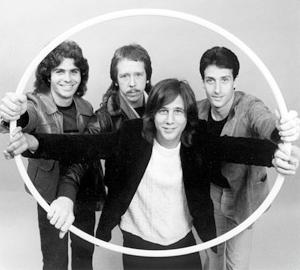 GK: Oh, yeah. There are times in your life that the way is clear. I remember coming home from a gig with the guys. We were in a van, and we pulled up to where I used to live. All of my stuff was piled up on the lawn, and it was raining.
GK: Oh, yeah. There are times in your life that the way is clear. I remember coming home from a gig with the guys. We were in a van, and we pulled up to where I used to live. All of my stuff was piled up on the lawn, and it was raining.
I thought, “Oh, God. My first wife had done it.” We pulled up to the house, and I remember Steve, the bass player, looked at me and just went, “Well, you might as well just keep on going. You’re not going in there.”
There was a Japanese restaurant. I went up there with Stevie, and we were pounding down hot sake. I didn’t know where else to go. It was a cold, rainy night, and we were getting toasted. There was an old Japanese dude there at the sake bar, and he kept saying, “They don’t write ‘em like that anymore.” I thought, Yeah, damn. They don’t, do they? So we got the idea, we wrote that song probably in 15 minutes. All of the great songs are written quickly, by the way.
You have to take a lesson that the stuff that’s real, it’s in you and it’s got to come out like that song. I’d really broken up that very day. It wasn’t like I was trying to feel like what’s a guy like when he’s broken up. I was living it. When things are real, they’re always better than when they’re fiction, if you can dig what I’m saying.
LT80s: Absolutely. You’ve got quite a whole range of songs about breaking up. You went on to have more breakups, I assume?
GK: Oh, yeah. How did you know?
LT80s: There’s a whole host of them on the new anthology.
GK: I just couldn’t get it right. Plus, I had terrible luck with women. Now I’m with my third wife, but I believe the third one is the charm.
I think part of it was that I was just a crazy rock star. I was out there doing drugs, womanizing, drinking, constantly on the road, and doing all the occupational hazards that a rock guy would face. I really had all of those problems.
Really, I was a novice. It wasn’t like I was used to this kind of life style; it took its toll. I was smart enough and lucky enough to pull my act together. Part of it was, I think, growing up emotionally and growing up as far as relationships are concerned. The other part of it was expanding my horizons, getting into writing, getting into radio, and being less Joe Rock Star and more Joe Well Rounded Guy.
LT80s: Speaking of your books, you’ve got four novels and a book of short stories that are coming out on the iPad and Kindle this fall. Are they already out?
GK: Yeah, as a matter of fact, the first one’s out. It’s called Mojo Hand. You can get it on iTunes right now, and they have formatted it for Kindle and all of the digital download formats, there are several. It’s now available in every format, as well as Kihnplete, our new multi-CD set. That’s also available for download, and that’s also available on iTunes. Have things changed, or what? You go to the iTunes store, now. You don’t even leave your house.
LT80s: I read Horror Show about a year ago and loved it. Are there still movie plans for that?
GK: Yeah, I’ve been holding that one back. We had interest at several points to sell the movie rights to it. The first time I was tempted because I wanted the money. Then I thought, No. It’s never gonna get made, and these are not the right people, so I held back. Corbin Bernsen approached me like a year and a half ago. He says, “This is great. I’d love to do the movie on this.” I did generate a script for him, and it got put on the back burner because Psych was picked up for another two seasons. If we do it with Corbin, it probably won’t be until next year or possibly the year after that. In the meantime I’m thinking, I’ll just do this when I’m good and ready. I want it to be right, and I don’t want to rush it. If that means waiting, that’s good, that’s okay. I don’t mind waiting.
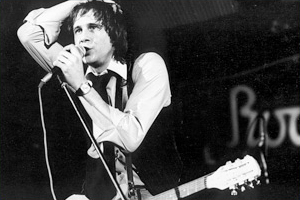 LT80s: You describe yourself as a “three-chord, guitar playing, sumbitch.” I love that.
LT80s: You describe yourself as a “three-chord, guitar playing, sumbitch.” I love that.
GK: As a guitar player, I’m a well-known lame guitar player. Originally, I was a folkie. I learned those three chords back when I was singing “Tom Dooley” and songs like that. Then it was a quick hop, skip, and a jump to rock and roll. But rock and roll, originally, was that three-chord beast. I loved early Elvis and Buddy Holly.
I guess if you were gonna say my music sounded like anything in the early days, it probably sounded a little like Buddy Holly; very basic, economical, three-chord rock. By the time it got to ’83, “Jeopardy” was a hit, which we had written on the keyboard. I remember an A&R guy saying, “I can’t get your record on the radio unless it’s got a synthesizer on it.” I remember thinking, We’ve come a long way from Little Richard, haven’t we?
LT80s: How did you feel about the push to use synthesizers?
GK: I did a half-assed embrace. I embraced it, but in a way that we were never really…”Jeopardy” was a big dance hit. It was a big club hit, although I can’t dance, and I never went to clubs. I was kind of a counterfeit rock star for these people because we came at that from a musical direction, it wasn’t a style thing.
The really interesting stuff is when that became a number one worldwide hit and I had to go to Europe every month. I was over there in France, Germany, and all over Europe. This was during that disco era. Everybody had the big hair, the padded jackets, and there was a lot of style involved. Maybe I was in over my head, because I’m just a jeans and t-shirt guy, and I was in a world of puffy shirts.
LT80s: I saw you performing “Lucky” on Solid Gold on YouTube, and you were rocking the shoulder pads and the hairspray – don’t you love the 80s?
GK: Oh, yeah. I just recently saw that. It was the interview with Dick Clark, and I thought, Geez, man. I look like a real parrot. I’ve got to tell you, that was when I was married to my second ex. She was a model, so she used to dress me up for stuff like TV shows. It wasn’t really me; maybe it was a little bit. I remember seeing myself on Saturday Night Live recently, and I thought, Holy Cow. I just looked crazy. It was the ‘80s, and it was the era of the big hair and the padded shoulders.
LT80s: Your son, Ry, is your lead guitarist now. What’s it like playing with him?
GK: I love it. It goes beyond musicianship; it’s family. I’m so proud of Ry, because he’s really one of the best guitar players I’ve ever seen. You know, we had Joe Satriani in the band, so there were some pretty big shoes to fill.
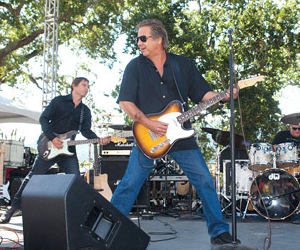
Greg Kihn and his son Ry
Ry was a student of Satriani’s back in the early days. He was a graduate of Berklee College of Music and Cal Art, so he really was a great guitar player. By the time he was 13 he was already a prodigy, so nowadays he’s in a couple of bands. I just love playing with my son. Now that I’m a grandpa (my daughter had a son, and he is now two and half years old), my goal is, I tell everybody this, in maybe ten or fifteen years from now I want three generations of Kihns in the band. I want my son, Ry, and my grandson, Nate. Wouldn’t that be a trip? God, I would love that. If I should live so long.
LT80s: I love the solo that Ry does at the end of the live version of “The Breakup Song.”
GK: Yeah, he really stretches that out. That’s all him. He got really creative with it, and he took it to places it hadn’t been before. I also love his Lynyrd Skynyrd meets Green Day solo in “Boulevard of Broken Dreams” where he just rips out. I tell you, we had a lot of fun making Kihnplete. When I went to look and see how much stuff we had in the can, I was shocked. We had several full, complete albums in the can plus a whole bunch of live stuff. When I digitally remastered it and had to remix some of this stuff, it was just a pleasure. I couldn’t believe how good it sounded after all these years. It was a labor of love.
LT80s: Kihnplete has a wide range of musical styles—you’ve got things on there like “Noa Noa” and “Blood Red Roses” that are unlike what most people have heard from you.
GK: It’s ironic. I was making those acoustic albums, Horror Show and Mutiny with songs like “Noa Noa” and all those acoustic tunes while I was staying at my mom’s house in Baltimore in my old room. It was really something. My mom and dad died a year after that, so every time I listen to that album I get misty about it because it was the last time we were all together and it was really a beautiful thing. I’m very proud of those acoustic albums. I do have diverse interests. I think having songs about Gaugin and Picasso, it was just fun.
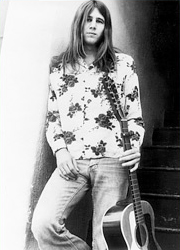 Yeah, a little bit of this and a little bit of that. You know what I say? I say follow your dream. If you’re a young musician, don’t let them pigeonhole you. You just go out and do what you want to do. Eventually, the world’s gonna catch up with you. Don’t worry about getting categorized; I never did.
Yeah, a little bit of this and a little bit of that. You know what I say? I say follow your dream. If you’re a young musician, don’t let them pigeonhole you. You just go out and do what you want to do. Eventually, the world’s gonna catch up with you. Don’t worry about getting categorized; I never did.
LT80s: Let’s talk about your Weird Al parody. I know you’ve said before that you were flattered to have been selected for a parody. I’m sure that is a great honor for anybody that Weird Al picks. It will always have a special place in my heart because my husband actually lost on Jeopardy.
GK: Oh, he did? He must be really smart to get on that show, you know.
LT80s: Yeah, he’s a smarty, but he’s a third-place-smarty.
GK: That’s really a great story.
LT80s: We sang a lot of “I Lost on Jeopardy” to him, mercilessly after his ugly defeat.
GK: I love Don Pardo when he comes in at the end. “Here’s what you didn’t win,” and “You brought shame to your family.”
LT80s: Exactly. Do you ever find yourself singing Weird Al’s lyrics instead of your own?
GK: Yeah, every once in a while I slip into that. It’s true. I had such a fun time. I was in the video for that song. Weird Al was just a pleasure; he’s a great guy and a pleasure to work with.
LT80s: Have you ever covered his cover of you?
GK: No, I haven’t. That’s interesting, covering the cover of me. I should do that, shouldn’t I? Maybe we’ll do that at the next gig. That would be a lot of fun. We’ll get Al to come out and make a cameo.
LT80s: Talk a little bit about your time with Beserkley Records.
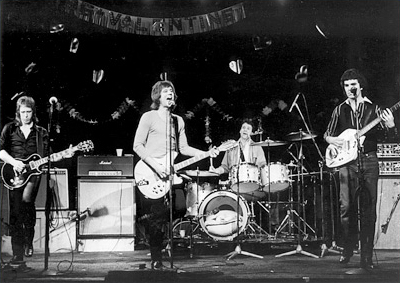 GK: It was wonderful, because we were the first really, truly, independent label of the modern era. We pre-dated new wave, punk, and all that stuff. We were really for real. Those early records, we shrink wrapped them ourselves in the back of Rather Ripped Records in Berkeley. We were distributing those out of the back of a Volkswagen bus. That was the real deal.
GK: It was wonderful, because we were the first really, truly, independent label of the modern era. We pre-dated new wave, punk, and all that stuff. We were really for real. Those early records, we shrink wrapped them ourselves in the back of Rather Ripped Records in Berkeley. We were distributing those out of the back of a Volkswagen bus. That was the real deal.
The fun part about it was as we started to get successful, we kept this guerilla attitude, and it was so much fun. Beserkley allowed us to do whatever we wanted to do musically, so we were encouraged creatively. We had a great run, we really did.
The beautiful thing about being on Beserkley was I controlled all my own music. I controlled it when we went in the studio and on stage. There are not a lot of bands that can say that. You look back and you go, “It was all the producer.” In our case, it wasn’t. We really did organically learn how to do everything as we were doing it.
LT80s: I love the version of “Roadrunner” where you do the backup vocals for Jonathan Richman.
GK: That was a trip. Jonathan is one of a kind, I’ll tell you. I love that man. He’s very singular. He’s eccentric. He’s very artistic and creative. It’s like hanging around with Picasso. As we all know, Pablo Picasso was never called an asshole.
LT80s: Greg, thank you so much. I’ve always been a huge fan. I really appreciate your taking the time.
GK: Thanks, Alli. You’ve been a sweetheart. Tell your hubby, “Better luck next time on Jeopardy.”
Connect with Greg at www.gregkihn.com and on Facebook and Twitter. You can also listen to Greg in the mornings on KFOX online by going to www.kfox.com. You can download four free tracks from the new 3-CD anthology, Kihnplete, by clicking here (including a very cool version of the song “Another Girl, Another Planet.”)
